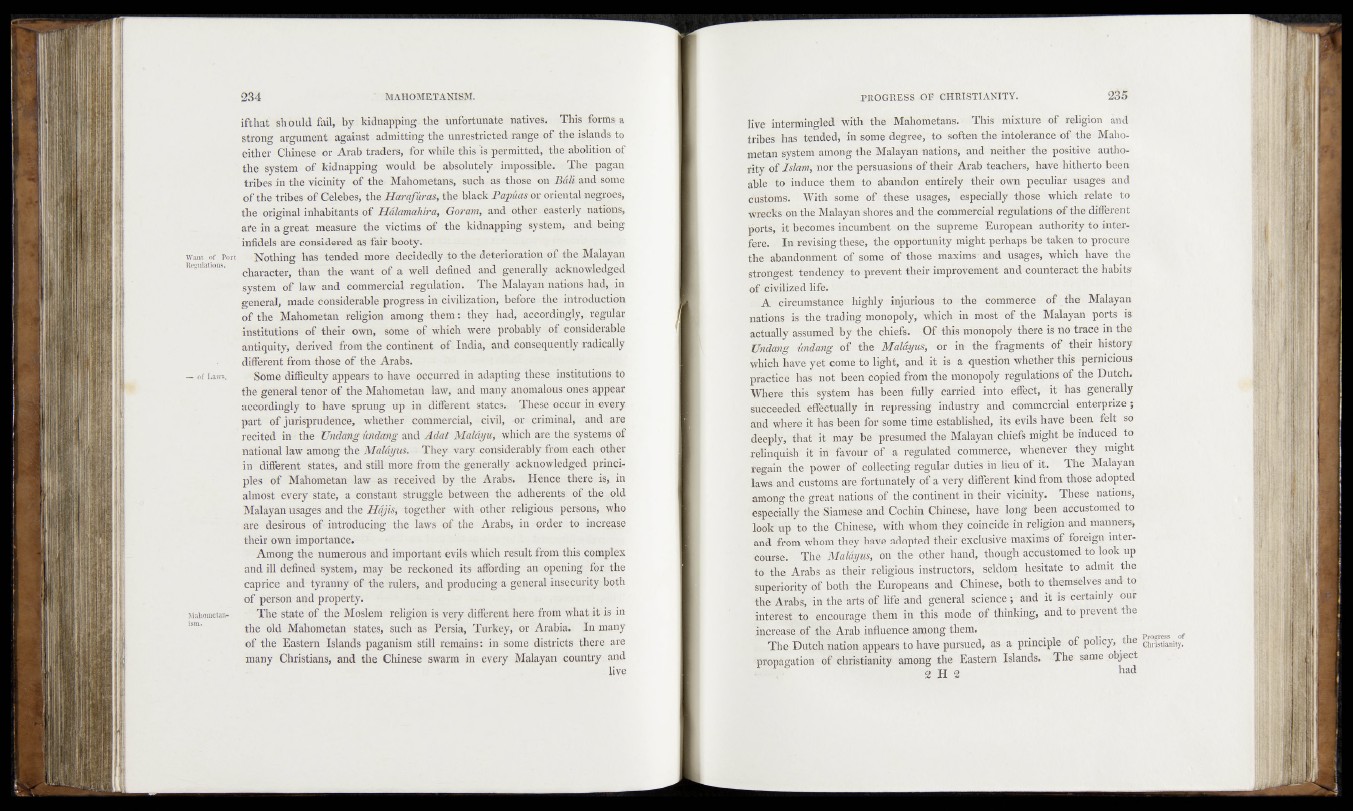
if that “Should fail, by-.kidnapping-the unfortunate natives. This forms a
strong argument, against , admitting the unrestricted range of the islands to
either Chineseltir Arab traders, for- while this is permitted, foe* abolition of
’ the system of kidnapping would be absolutely- impossibles r The- pagan
tribes in the vicinity of the- Mahometans, such-as-those -on BMk andjsome
of the tribes of Celebes, the Harqfiras, the black Papûas or oriental negroes,
the original inhabitants of Hâlamahîra, Goram, and Other..easterly nations,
afe in a great measure the victims of -the kidnapping system, and being
infidels' are considered as fair booty. •
want of Port Nothing- has j tended more decidedly cfo the deterioration of the Malayan
fteguiatwHs. cliaracter> than the-want of a well defined and-generally acknowledged
1 system of law and commercial regulation.- Thh Malayan nations had, in
general, made considerable progress in civilization, before, tiepin traduction
of foe Mahometan religion among them s they had, accordingly*, regular
institutions - of their own, some of_ which were probably .©f-eoisiderable
antiquity, derived from the continent of; India, and consequently 'radically
- différent item-those offoe Arabs.
— of Law», Some difficulty appears to have occurred in adapting these insttetionsiio
the general tenor of the Mahometan law, and many anomalous ones appear
accordingly to have sprung up in different states« These1 occur in every
part of-jurisprudence', whether" commercial, civil, -or criminal, and. are
recited inj the Undang ûndang and Ad&t M alays -which iuti.;blteSystess^tf
national law among the MaMym. ■ - They vary-considerably-fiiom eaeh other
in different states, and still more from the generally .acknowledged priaei-
pfes bf Mahometan law as received by the Ajrabs. Hence, ifoere-ris,. pi
almost every state, a constant struggle between the, adherents;-of the ..old
Malayan usages and the ffltyisi together with-other religious personshASho
are desirous o f introducing the laws -of the Arabs, in order to Ancrggsg
their own importance.
Among the -numerous and important-evils which result from this complex
and ill defined system, may be reckoned its affording an opening fbj&tfhe
caprice and- tyranny of the rulers, and producing a general insecuritycboth
of person and property. •
Mahometan- ■ The state of the Moslem religion-is very different here from whafc.it is in
the old Mahometan states, such -as- Persia, Turkey, or Arabia. In many
of the Eastern Islands paganism still remains: in- some districts there are
many Christiana, and the Chinese swarm in every Malayan country, and
live
live-intermin^ed'wftk the'-Mahometans.' This mixture of tdigion and
tribes? has ^tended, vin some degree^ to soften the intolerance of the Mahometan
system-among the Malayan mations, and .neither the positive authority
ofi#.sZ&mj(tooT*<the' persu'asions-oftheir Arab teachers,1 • havefoitherto been
able tô\ 'iikdiirie them fo abandon entirely their own peculiar usages and
Customs. With some^&ËfotK’eSe usages, i especially those which« > relate to
Wfocks on the Malayan'shores'and the commercial regulations Of the different
it becomes1 incumbent on the supreme European authority to interfere.
- Inurevising these, theiopportunity might perhaps be taken to procure
the- abandonment of some of those maxims* and' usages, Which have the
gyrdngplfe' tendency to prevent tiiein improvement and counteract the habits'
of-Srivilized life.1 "
A circumstance - highly injurious -to«the commerce of the Malayan
nations is the trading monopoly^ which in most ■ of the Malayan ports is
actually assumed tiy the chiefs. Of this monopoly-rihere is no tracé in tiie
Undang ûndang o f the Malâyus, ' -or ' in the fragments of their history
Which have-yet come to light, and-it is a question whether1 this pernicious
practice has not been copied from the monopoly regulations of the Dutch-
Where tins 'system has been fully carried*-into' effect, it has generally
succeeded -effectually in repressing industry and commercial enterpnze ;
ânff Wh^fo h has been for'sometime established, its evils have been felt so
deeply, that' it may bé. presumed the Malayan -chiefs might be induced to
relinquish' it hi' favour of-‘a regulated commerce, whenever they might
tpgain the?pbWet of collecting regular duties iu'.lieUtif i t .1 The Malayan
laws-and custom^ me fortunately of a very différent kind from those adopted
among the great; nations of the continent in their vicinity. These nations,
especially the Siamese' and Cochin Chinese, have long been- accustomed to
look up to the ■Chinese, with whom they coincide tin religion,and manners,
and from whom-thëy have adopted" their exclusivè maxims of foreign inter-'
bourse. The Malâyus, tin the other hand,- though accustomed to lookup
tortile îfcfabs as their,.religious inWxhàfc&fs* seldom hesitate to admit the
superiority of both-'foe Europeans and Chinese,- both to themselves s.nd^;s,
the Arabs, tin- the arts of life and general science ; and it -is1 certainly our
interest r, to ^ ticourage foem" in this mode of thinking, and to'prevent e
^nçrease^ the. Arab influence among them. , ; : ^
; The Dutch nation appears to have pursued, as a principle of policy, the Christianity,
propagation of Christianity among the Eastern Islands. The same object
2 H 2 had